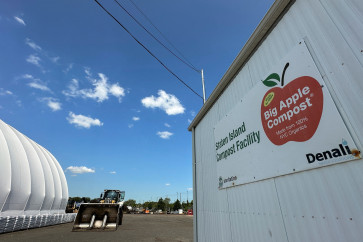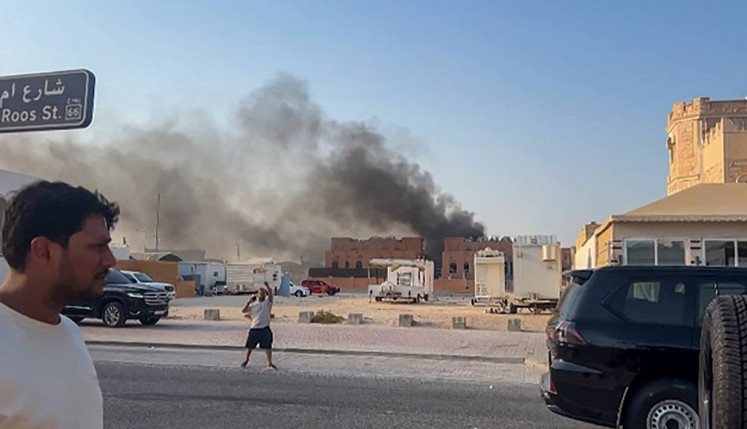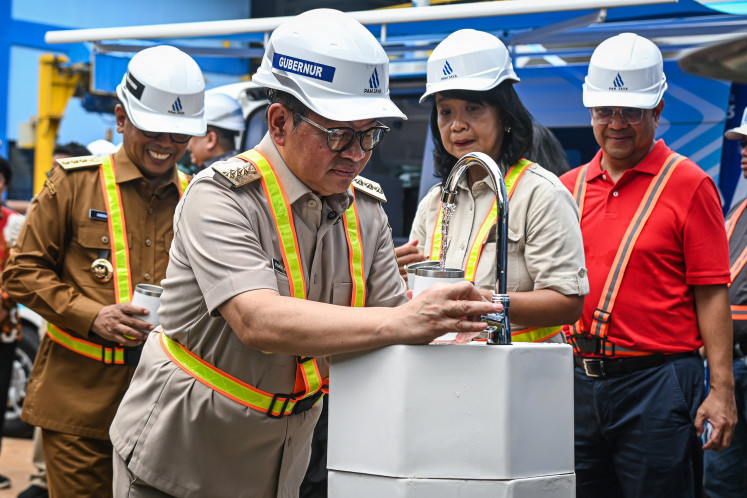Popular Reads
Top Results
Can't find what you're looking for?
View all search resultsPopular Reads
Top Results
Can't find what you're looking for?
View all search resultsImmediate action sought to prevent catastrophe in Jakarta
Jakarta has at least two problems that may paralyze the city soon: traffic congestion and flooding
Change text size
Gift Premium Articles
to Anyone
J
akarta has at least two problems that may paralyze the city soon: traffic congestion and flooding. The two are related because when roads flood, traffic almost comes to a halt. And the two problems are getting worse.
With hundreds of new motorcycles and cars being sold in Jakarta every day, it is predicted that within a few years the traffic will come to a complete standstill.
The total length of all cars combined exceeds the total length of roads. This is simple mathematics. No simulation of sophisticated computer modeling is needed to predict this complete traffic jam.
Flooding will also worsen because larger buildings are being built and more groundwater is being pumped out, both of which result in land subsidence, a few centimeters per year.
Meanwhile, residents of Jakarta continue to throw garbage in rivers, reducing the capacity of the rivers to contain rainwater. Many wetlands have been drained, filled in and had buildings and impenetrable roads built on them.
Rainwater has little chance to infiltrate the soil to recharge groundwater. Instead, most of it becomes run off, flowing on impenetrable land surface, inundating low lying areas.
Even without rising sea levels due to global warming, flooding will occur more often in Jakarta.
A simulation of computer modeling has predicted that in 10 to 20 years much of Jakarta will be
permanently inundated.
Despite this looming danger, the government has not acted prudently to avoid the disaster. Instead, when a terrible traffic jam crippled Jakarta after rain last month, the governor blamed the weather.
Of course, the weather played a great role in causing the floods, which in turn caused traffic congestion, but rain always falls in the rainy season.
So the government should have taken preventive measures to prevent floods and the subsequent traffic congestion.
The government doesn’t need more theories to solve the problems. The governor claimed during his election campaign that he was the expert who could solve the city’s problems.
Furthermore, many solutions have been presented through the press, television and radio.
To alleviate traffic congestion, a mass rapid transit system must be built, whether monorail or subway, and private cars must be limited. There is no other way.
To reduce flooding, more land should be allocated for green spaces; wetlands and streams should be restored, the use of groundwater should be prohibited or at least severely restricted and permits for large building construction must be restricted.
The sooner we start implementing solutions the better. Delaying the process will only make the matter worse.
Of course, it will not be easy to take the necessary measures to prevent disaster. Many big companies will fight such measures if their economic interests are jeopardized.
It is also possible that foreign governments will back these companies.
Even ordinary people will protest if their comfort is sacrificed. So, only a strong leader can implement this very difficult task.
A weak leader will yield to pressure and play safe by postponing the solution until his term ends.
The governor of Jakarta or even the President must lead the job. He must clearly explain the goal of preventing future disaster.
To get wide support, the government must involve community leaders, intellectuals and celebrities to educate the public through discussion, media campaigns and religious sermons.
Also, the government must ensure that all projects resulting from these disaster prevention measures are conducted transparently to avoid public suspicion.
But realizing that the President and the governor lack firmness when dealing with serious problems, all stakeholders that have a good understanding of the problem, such as environmental NGOs, journalists, academics and researchers, must be active in pushing the government to take action.
This threat is really serious and must be taken as such. Even a layman is able to envisage this coming disaster quite well, let alone a visionary intellectual.
More than 10 million people live in Jakarta. Many important business centers, embassies and government offices are located in Jakarta, including the presidential palace. Great economic, political and cultural assets are at stake.
If we fail to prevent this environmental catastrophe, we will suffer tremendous economic, political and cultural losses. Ten or even 20 years from now is not long. So, we must act now, or we are bound to experience a calamity.
A simulation of computer modeling has predicted that in 10 to 20 years much of Jakarta will be permanently inundated.
The writer is a lecturer at the University of Bengkulu’s School of Forestry and currently writing a book at James Cook University in Queensland, Australia.










